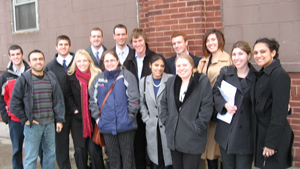Northwestern Medical Students Among Those Aiding the Homeless
 |
| Medical students from three schools joined forces to provide health care to the homeless at a shelter on Chicago’s West Side. |
The homeless generally have two daily priorities: food and shelter. On March 3 students from three regional medical schools including Northwestern made sure that health care became another must-have—not just for a day but for a lifetime—for individuals finding refuge at a Chicago shelter.
Attending the American Medical AssociationâMedical Student Section (AMA-MSS) Region II meeting at the Feinberg School, 14 medical students participated in a regional community service project organized by students and faculty members from Northwestern. The participants—including some from the University of Iowa and Mayo Medical School—conducted free health screenings for the homeless at the Franciscan House of Mary & Joseph on the city’s West Side. Offering blood pressure checks and blood glucose monitoring to screen for hypertension and diabetes, the project allowed the students to experience an “alternative” environment for providing care.
“This site is a very different venue for most medical students,” explains Bechara N. Choucair, MD, assistant professor of family medicine. Medical and managing director of Heartland Community Health Center, which provides primary care and referral services for some 80 homeless shelters in Chicago, Dr. Choucair served as a link to the 250-bed Mary & Joseph facility as well as supervised the students at the AMA-MSSâsponsored event. “It is not a routine setting like a doctor’s office where patients present an insurance card for their care. Here people line up as early as 2 p.m. hoping for a place to sleep that night.”
Setting up a mobile clinic inside the shelter, the students obtained patient histories and provided health screenings and patient education materials to 28 shelter residents who signed up for the free health care event. The volunteer medical team diagnosed hypertension in eight patients; four were started on medication right away, according to Dr. Choucair. He adds, “Five participants showed signs of glucose intolerance—one step before becoming diabetic—and one person had full blown diabetes with all the signs and symptoms and was completely unaware of it. Another participant with HIV/AIDS was without meds for five days. We worked with him to make sure he received his medication by Monday.”
The team referred all shelter participants with abnormal findings to Heartland Health Outreach nurse practitioner Diane Judge, ANP, who sees patients at the shelter each week for follow-up care. Providing emergency meals, overnight accommodations, and visits by medical and mental health professionals, the shelter comes to the assistance of both men and women on a first-come, first-serve basis.
“The experience was great,” shares Feinberg medical student Andrew E. Kott of Green Bay, Wisconsin, who helped to organize the event with fellow student Ava Hosseini of St. Louis. Both represented the Feinberg School at the event. “This is a side of Chicago that most medical students don’t see, even with the numerous free clinics that Northwestern students run. The homeless is definitely a forgotten population of patients as was evidenced by our findings. While this was a small event, health care for Chicago’s West Side will benefit as a whole because we were able to identify a population that needed additional help.”






